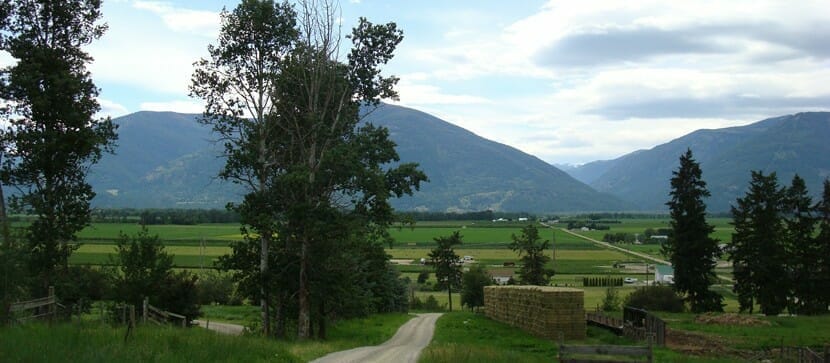I recently had an opportunity to speak with Kathleen Gibson, a Victoria-based BC Food Systems Network (BCFSN) representative and 2006-2007 Powers of Leadership (POL) alumna. We talked about politics, deep purpose, and the current state of British Columbia’s Agricultural Land Reserve (ALR), as well as the ways in which the POL program aided Kathleen’s evolution as a leader in the sustainable food systems movement.
Bill 24—described by BCFSN as, “[splitting] the ALR into two zones and [devolving] oversight of the ALR to six regional panels”—has been a widely-covered issue across the province since it was introduced by the BC government in March 2014. In a parliamentary system which does not lend itself to transparency, Kathleen suggested that it’s easy to think Bill 24 passed despite public outcry, and without appropriate, province-wide public discussion, because of back room dealing and political favors. Effectively, the passage of the bill makes it easier for a vast tract of British Columbian farmland to be opened to non-agricultural development. This creates the fear, in those who value food sovereignty and sustainable agriculture, that BC will permanently lose viable farmland and, as a consequence, become increasingly dependent on drought-susceptible Californian imports. BCFSN put a lot of energy into the attempt to preserve the ALR this spring, and was disappointed by the Bill’s recent passage into law.
Today, Kathleen and her colleagues in BCFSN face an ever-popular question: “what now?” To answer that, she relies at least in part on the lessons of Powers of Leadership. “I’m having a major rethink about how to hold that sustainable food goal. It is valuable to reflect on what we’ve learned here.” Kathleen said that an upcoming BCFSN conference will provide an opportunity for group reflection on questions of strategy, purpose, and next steps, and that she’ll draw on her POL experience for inspiration going forward. “I’ve tremendously valued the common language and the emotional support of POL [alumni],” she said. “I certainly would have tried [to preserve the ALR] without POL, but I don’t think [the experience] would have been anywhere near as positive.”
Kathleen said that she came out of POL with new inspiration to serve the planet and other people—“to what is genuine, regenerative, and meaningful.” She said that this, along with the friendships formed through the program, has been of lasting value. “I can’t imagine an experience of leadership now without that kind of support.”
Kathleen points to POL’s influence on her efforts to protect the ALR. “POL has been instrumental in my being absolutely determined to get our work supported. In [our ALR team], we immediately built an advisory group and asked them for help. It’s an understanding of leadership I didn’t have before.” She added that in addition to the importance of peer support, POL taught her to rely on a mixture of training, instinct, and ability. “It’s being in that place where nobody knows the answer. You’re on the bridge of the boat in the pack ice, trying to find your way to the open water.”
Kathleen describes the POL type of leadership as ideal in groundbreaking situations, when one is “trying to create something new that doesn’t exist, and getting it past the prejudice and constraints of the existing system.” When she was working on policy reform around BC abattoirs to benefit small farmers, she drew on POL’s lessons with her team. “Each time I went to POL, I brought the lessons back. We talked about defining moments, what we were doing, and why were were doing it. If that deep purpose was threatened, we would stand up and say no.” Kathleen said her team of 10 did that twice—at the risk of their jobs. It worked out. “As the work unfolded, we would say, ‘can we still do this in good conscience? Who are we here to help? What are we here to serve?’”
Today, Kathleen’s drawing again on those lessons. Looking back on her experience of wrangling with the BC provincial government over Bill 24, she has asked herself, “How did it go? Did it serve our deep purpose?”
As our interview drew to a close, Kathleen added another POL pearl of wisdom, from the lesson of the smoke jumpers: “Stay in the fire,” she said, “and keep an open heart.”
—Marnie Jones


Thank you, Larry . . . it was delightful to learn about Kathleen and all that she took from the program into her work!
Beautiful interview, Marnie! This is the kind of work that both strengthens the POL itself and, in a larger way, builds the Institute as a place where important impacts are generated and where we take those stories out to inform and inspire a larger public